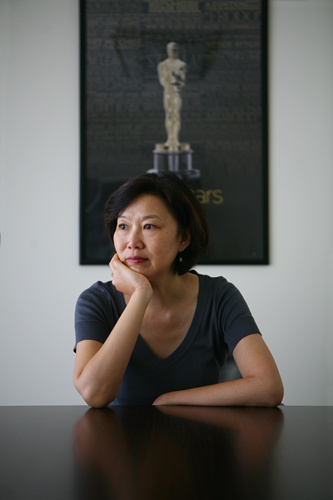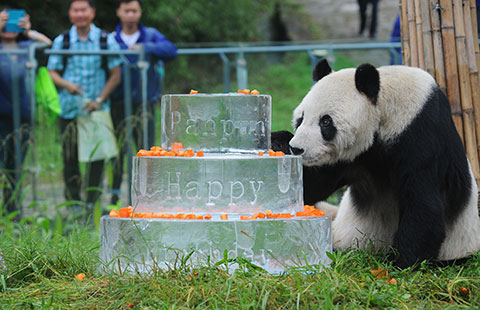Ruby Yang: Making an impact through film
Updated: 2015-08-08 01:27
By HUA SHENGDUN in Washington(China Daily USA)
|
||||||||
 |
|
Ruby Yang. PROVIDED TO CHINA DAILY |
Think young people portrayed in Hong Kong films and most likely you think gangster, teen love, and the 8 million ways to commit a crime.
But earlier this month, Oscar-winning documentary filmmaker Ruby Yang helped dispel those stereotypes when her latest production premiered in the US. The documentary, featuring a group of under-privileged middle school students rehearsing and producing a musical, was so authentic it was almost uneventful, yet completely inspiring and heartfelt.
Yang described the theme of her new film, My Voice, My Life, as “the issue of inclusion”, which has been at the core of her storytelling throughout her career.
It was her documentary The Blood of Yingzhou District, about children in China’s Anhui province who have lost their parents to AIDS, that made Ruby Yang’s name and won her an Oscar in 2007. Her work often features marginalized populations and social issues.
Another theme in her work is the Chinese-American experience of living between two worlds, understandably so.
A Hong Kong-born Chinese American, Yang moved to the US in 1977, and got into documentaries as a young art school student in San Francisco.
After earning a degree in painting, Yang found herself drawn to the trend of doing short personal films. “The form of film provides a bigger canvas for me,” Yang said. “Painting is one-on-one.”
“Now we have MTV and ‘micro films’, but it was all very progressive and avante guard back then,” she recalled.
She finished graduate school with four short films of her own and started working with several Chinese-American filmmakers in the early ’80s.
She got involved with an Asian-American organization that “wanted to present a more diverse and deeper understanding of the image of Asian Americans on public television,” said Yang.
Her early works, such as Dim Sum Take Out, China Cry: A True Story, and China: The Wild West, tried to tell the Chinese story. Yang also helped edit The Joy Luck Club, the feature film made from Amy Tan’s best-selling novel.
Having lived from the ’70s through the 21st century, Yang feels like the image of Chinese Americans has evolved greatly. “I’m old enough to have gone through a couple of stages”, she said jokingly.
“In the beginning of my career there were only a handful of Chinese-American filmmakers in the industry,” she said. Mainstream society had no idea what Asian Americans, let alone Chinese Americans, were like.
In the ’80s, diverse stories began to appear on public television. “In the ’90s, there started to be more images from China, and powerful feature stories from China started to change things,” Yang recalled.
By 2000, there were so many successful Asian Americans everywhere on the Internet. The “glass ceiling” had been shattered. “Now there’s a lot more understanding about what China is about, and also Japan and Korea. It’s an ongoing process,” she said.
Yang said she wants to focus more on China for future productions, as “there’s a lot more stories going on. It’s a changing environment, politically and society wise.”
As Yang took a teaching position at Hong Kong University and moved her focus back to the city she was born and raised in, she also produced her new film, My Voice, My Life. It chronicles middle school students who confront each of their unique personal challenges — from low self-esteem to family conflicts and blindness — as they work together to produce a musical over six months.
“I think there is a lot of misunderstanding with young people in Hong Kong,” said Yang. “People featured in this movie did not do well in school, but that doesn’t mean they don’t have talent, or other skills in life. I think it’s how one tries to discover them, and not stigmatize them and put a label on them. A person should be judged by his all-round, 3D personality.”
Yang decided to make the documentary when she was invited to one of the rehearsals. The defining moment was when they started to sing. “I could see they were singing from the heart. There was nothing pretentious about it. It was bare truth.”
She was also interested in how the film could touch on the issue of inclusion. “The starting point is how these children with disabilities can be accepted in school, and then in the larger sense in society without labels and stigmas, as well,” she explained.
“When I was in school, I wasn’t one of those good students with the best grades either,” said Hong Kong star Andy Lau in a trailer for the film. “Fortunately, in school, there’s always somebody who never gives up on you. Our upbringings may be different, but we experience the same kind of love.”
“I think the main thing is about love and care of society,” Yang said.
The film premiered in Hong Kong last October and played in theaters there for 5 months. It made more than $600,000, impressive since documentaries don’t usually do well at the box office, especially in Asia.
Yang said she wanted the film to showcase the spirit of Hong Kong’s young people, but she also believes the spirit is universal, and the film transcends cultural barriers so that “people can relate to the story as a parent, as a teacher or simply as a human being.”
After studying and building a career in the US, Yang spent most of the past decade in Beijing producing public service campaigns promoting awareness of AIDS, second-hand smoke, hepatitis and more. One of her public service announcements aired on CCTV and starred First Lady Peng Liyuan.
“It takes a lot for documentaries to really make an impact — the right storytelling, the good intention, the awards. It’s a combination of many things,” she said.
And documentaries are still more compelling for her than fiction, since they depict real life, and “you spend time with the subject, and witness their transformation,” she said.
Liu Jingyang in Washington contributed to this story.
- World's oldest male panda celebrates 30th birthday
- Women's development in China contributes to global equality: white paper
- China releases full text of reform plan for ecological progress
- Upgraded combat drone is unveiled
- Villagers scoop up big profits by drying fish
- Food safety a long-term endeavor
-
 From Iowa farm to White House: Look back at Xi's US visits
From Iowa farm to White House: Look back at Xi's US visits 
 Buses with images of 6 endangered animals of China drive in US
Buses with images of 6 endangered animals of China drive in US
 Burberry Prorsum Spring/Summer 2016 collection
Burberry Prorsum Spring/Summer 2016 collection
 Top 10 favorite hotel brands of rich Chinese
Top 10 favorite hotel brands of rich Chinese-
 Top 15 Chinese CEOs to attend US roundtable during Xi's visit
Top 15 Chinese CEOs to attend US roundtable during Xi's visit -
 House showcasing Sino-American friendship opens to visitors
House showcasing Sino-American friendship opens to visitors -
 To be continued...
To be continued... 
 World's oldest male panda celebrates 30th birthday
World's oldest male panda celebrates 30th birthday
Most Viewed
Editor's Picks

|

|

|

|

|

|
Today's Top News
Young people from US look forward to Xi's state visit: Survey
US to accept more refugees than planned
Li calls on State-owned firms to tap more global markets
Apple's iOS App Store suffers first major attack
Japan enacts new security laws to overturn postwar pacifism
Court catalogs schools' violent crimes
'Beauty of Beijing's alleys akin to a wise, old person'
China makes progress fighting domestic, international cyber crime
US Weekly

|

|







